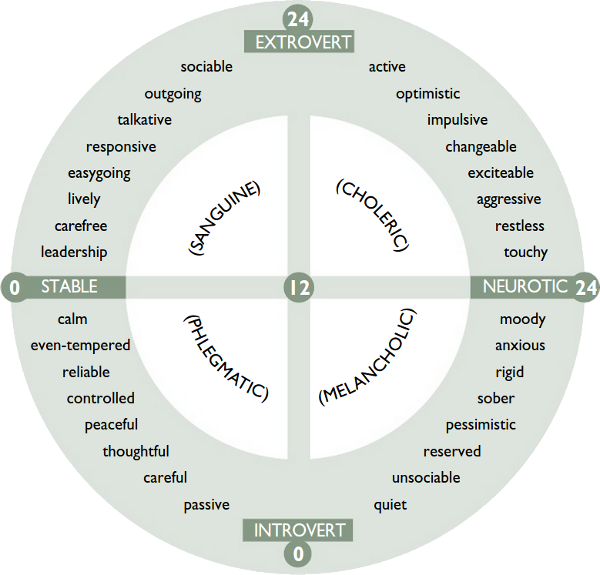Eysenck’s Personality Inventory (EPI) (Extroversion/Introversion)
- The ‘lie score’ is out of 9. It measures how socially desirable you are trying to be in your answers.Those who score 5 or more on this scale are probably trying to make themselves look good and are not being totally honest in their responses.
- The ‘E score’ is out of 24 and measures how much of an extrovert you are.
- The ‘N score’ is out of 24 and measures how neurotic you are.
To interpret the scores, your E score and your N score are plotted on a graph from which you can read your personality characteristics. The nearer the outside of the circle you are, the more marked are the personality traits. Please note that the EPI is a very simplistic type of personality measurement scale, so if you have come out as a personality that does not match what you thought before you took the test, you are probably right and the test is probably wrong!

Instructions
Here are some questions regarding the way you behave, feel and act. Each question has radio buttons to answer YES or NO. Try to decide whether YES or NO represents your usual way of acting or feeling. Then check those radio named YES or NO. Work quickly, and don’t spend too much time over any question, we want your first reaction, not a long drawn-out thought process. The whole questionnaire shouldn’t take more than a few minutes. Be sure not to omit any questions. Start now, work quickly and remember to answer every question. There are no right or wrong answers, and this isn’t a test of intelligence or ability, but simply a measure of the way you behave.
This test is a demonstration of psychological tests plugin.
The Eysenck Personality Inventory (EPI) measures two pervasive, independent dimensions of personality, Extraversion-Introversion and Neuroticism-Stability, which account for most of the variance in the personality domain. Each form contains 57 “Yes-No” items with no repetition of items. The inclusion of a falsification scale provides for the detection of response distortion. The traits measured are Extraversion-Introversion…